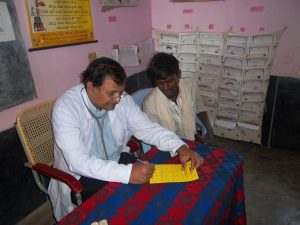By Ananye Krishna, a student at Nalsar University of Law, Hyderabad, India
The government of India launched the Ayushman Bharat – National Health Protection Mission in late March 2018 to provide health coverage of Rs. 5 Lakh (or approximately $7,335) per year for all Indian families. This was a much needed reform measure in the Indian healthcare system, but the question remains whether the government made required infrastructural changes in order to ensure the full benefits that would allow the Indian people to access their fundamental human rights to healthcare.
The poor state of healthcare in India was illustrated last year when more than 60 children died in a government hospital because of inadequate infrastructure. This was not an isolated incident. There have been cases of fires breaking out in hospitals and of surgeries being conducted en masse under extremely poor conditions. Such incidents demonstrate that the right to health as guaranteed by the Indian constitution is being violated through lack of adequate reform. Reports suggest that the government made its March decision in haste considering that primary health centers (state-owned rural healthcare facilities) across the country, specifically in North India, are in a deplorable state, rendering the reform inadequate.
From above, it is clear that the current state of the healthcare system will make it difficult for the people to benefit from the government’s reforms. Some activists have also suggested that this policy might be a political ruse prior to the 2019 Lok Sabha elections in order to ensure the victory of the ruling BJP (Bhartiya Janta Party) government. These half-hearted measures are not acceptable; democracy should not only be about winning elections and political patronage. It should be about the welfare of the people. A popularly elected government has a duty to ensure that the constitutionally guaranteed right to healthcare is not violated.

Furthermore, with India a party to International Covenant on Economic, Social and Cultural Rights (ICESCR), it becomes the duty of the government to protect the right to health of its people and provide them with the highest attainable standard of physical and mental health as provided under Article 12 of the ICESCR. Also, considering that India is a party to the World Health Organization constitution, it is important that the state follows the standards set by the international organization. When WHO states that maximum available resources must be put to use to ensure the right to health, these same standards should be upheld by the Indian government. Thus, it is important that the government focus its attention on the infrastructural and professional development of primary health care centers in India to protect the basic human rights of its people. These reforms are currently absent from the government’s plan to address the poor state of healthcare.
If proper infrastructural development is undertaken, it is possible that doctors wary of working in rural areas and in poorly equipped institutions could be attracted to work in these healthcare centers, for example. The current policy of making it mandatory for doctors to engage in rural service does not work toward any effective benefit because the deplorable state of government hospitals forces most of the people to turn toward private hospitals despite exorbitant rates at these facilities. Thus, the government continues to deny people their right to healthcare and forces them to bear an unnecessary financial burden when their financial state may already be poor. If any mandatory action has to be taken, then that action should be aimed at ensuring that no hospital, clinic or other healthcare institution overcharges it patients.
As mentioned previously, the current policy of the government is to prescribe mandatory rural service for doctors. This policy has been challenged by doctors who naturally find this to be an unnecessary restraint on their professional life. No other profession is subject to similar restraints. This policy even seems constitutionally unsound as it appears to violate Article 19(1)(g) of the Indian constitution, which states the people have the freedom to practice their profession as they wish. It is important for the government to understand that excessive regulation will lead to resentment among the people, harshly impacting the functioning of the whole democracy.
If the government truly seeks improvement in the health of its people and protection of their fundamental human rights to healthcare, then it will have to remove excessive regulations and engage in proper infrastructural development. When properly equipped healthcare institutions are built, doctors are more likely to be attracted to these institutions. To incentivize doctors, policy should consider more adequate compensation, on par with what the doctor would have potentially earned otherwise. Furthermore, if doctors have to serve in remote areas, the government should ensure that they have the necessary amenities to function at their full potential.
Under the current healthcare system in India, the pent up resentment and poor infrastructure negatively impact overall efficiency. Reform, if properly undertaken, can provide a strong base for building the Indian healthcare system and ensuring the rights of both the people and the doctors.
Ananye Krishna is a Year IV student at Nalsar University of Law, Hyderabad, India.
